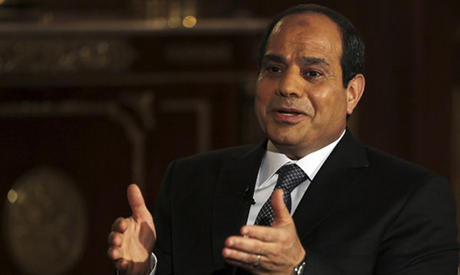President Abdel-Fattah El-Sisi and leading officials from across Egypt's political spectrum are set to meet on Wednesday to discuss the future of parliamentary elections
Gamal Essam El-Din , Wednesday 27 May 2015

Egyptian President Abdel Fattah al-Sisi (Photo: Reuters)
Anwar El-Sadat, chairman of the liberal Reform and Development party, told Ahram Online that he expects "the meeting [on Wednesday] will be like a national dialogue between El-Sisi and opposition politicians over a number of current issues such as the future of parliamentary elections, El-Sisi's visit to Germany next week, the death verdict against former Islamist president Mohamed Morsi on 16 May and foreign reactions to it, and the official opening of the new Suez Canal project on 6 August," said Sadat.
In Sadat's words: "I think the meeting will be like an earlier one held last January. It is a kind of an open national dialogue in which all exchange views without a certain agenda," said Sadat.
Sadat, however, said he believes that "the repeated delay in parliamentary elections" is the main reason for the meeting. "There has been growing discontent among political parties in recent weeks due to the repeated delay in parliamentary elections and the failure of El-Sisi to respond positively to unified amendments proposed by the opposition to the elections laws," said Sadat, expecting that "El-Sisi will seize the meeting to give his official response."
In a statement sent to parliamentary reporters on Tuesday, Sadat blasted El-Sisi, asking him to hold a public referendum on the constitution and parliament. "What is clear about El-Sisi's first year in office is that he and prime minister Ibrahim Mahlab's government have shown no interest in political reform, no respect for the constitution, no desire to foster a vibrant civil life," said Sadat's statement, adding that "if El-Sisi is not interested in implementing the constitution or the country having a parliament, okay let him invite the people to vote on this in a public referendum."
Informed sources said the invitation to the meeting was extended to around 30 political parties, including the liberal Wafd, the leftist Tagammu, the National Movement party, and the Salafist Nour party. Other parties like the Conservative Party led by oil business tycoon Akmal Qortam, the Egyptian Social Democratic Party led by political activist and doctor Mohamed Abu Ghar and the Free Egyptians Party founded by telecommunications business tycoon Naguib Sawiris.
Nagi El-Shehabi, chairman of the Generation (Geel) party, told Ahram Online that "all political parties expect that the future of parliamentary elections will be the main subject of debate during the meeting."
"Political parties have become worried about the future of polls and for how long Egypt will remain without a parliament," said El-Shehabi, wondering that "all have become confused which election laws will be implemented: the ones drafted by a government committee or the ones drafted by a number of political parties last month."
"As far as we know, the government-drafted laws were referred to the State Council's department of legislation and fatwas last month to be revised in constitutional and legal terms," said El-Shehabi, wondering "why the council has not so far finalised the revision process? The minister for parliamentary affairs, Ibrahim El-Heneidy, said last month that the revision would take only ten days, but we now have more than one month without clear results in sight," said El-Shehabi.
Al-Ahram newspaper indicated on Tuesday that "the council's revision of the laws was delayed because its chairman, judge Magdi El-Agati, was hospitalised from a heart attack."
"After judge El-Agati came back to the office this week, the department has begun revising the law on the division of electoral constituencies and next Saturday it will begin examining the other two election laws: on the exercise of political rights and the house of representatives."
Hussein Abdel-Razek, a leading Tagammu official, said "the meeting is a good step and should lead to tangible results. The meeting should clarify positions on a number of delicate issues, on top of which the necessity of opening the way for parliamentary elections," said Abdel-Razek.
Yehia Qadri, deputy chairman of the National Movement Party, said "most political parties agree that it is not a problem that parliamentary polls be delayed until election laws gaining national consensus are reached. What is necessary for political parties right now is that once parliament is formed, it remains immune to any future constitutional challenges," said Qadri.

No comments:
Post a Comment